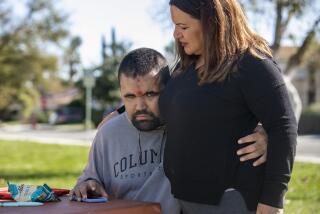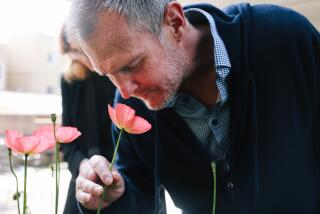Accused Hospital Killer Had Mental Problems
The man accused of shooting four people in a Mission Bay hospital emergency room has had psychiatric problems dating back at least 25 years, when his father went to court to have him examined for mental illness because he was “very hyperactive” and “on the verge of violence.”
Bradford Warren Powers Jr. may also have had a history of physically abusing his father, according to one doctor, who speculated that Powers may have been so worried that he caused his father’s death that it triggered the shooting rampage in the hospital emergency room.
“He was operating under a major guilt trip that he caused the demise of his father,” speculated Dr. H. E. Hammerstead, who tried to save the elder Powers in the hospital emergency room earlier Saturday. “He couldn’t accept it. He turned his anger outward rather than inward.”
He said the coroner’s office, however, found no evidence of physical abuse in the elder Powers.
Bradford Powers Jr., 46, was held Monday in the San Diego County Jail and is scheduled to be arraigned this afternoon in Municipal Court on two counts of murder and two counts of attempted murder.
Powers turned himself in to authorities about an hour after he allegedly opened fire in the emergency room of the Mission Bay Memorial Hospital, killing a nurse and student trainee, and wounding the on-duty physician and the father of a patient, police said.
On Monday, police searched the white Corvette that Powers was driving when he stopped to call police and found a 6-inch, eight-shot .22-caliber revolver.
“Eight or nine shots were fired in the hospital, and there are eight empty shell casings inside this .22,” said police spokesman Dave Cohen.
“And it’s believed the people were shot with a .22. So there’s a strong possibility the gun recovered from the car . . . is the one used in the incident.”
Homicide Sgt. Frank Martinez said police interviewed Powers and his family and learned that he was angry over the death Saturday morning of his father, well-known architectural illustrator Brad Powers Sr.
The shootings occurred about eight hours after the elder Powers died suddenly in the emergency room. His relatives then returned to their La Jolla home, where they began discussing the emergency room death.
“They said he was angry (at the hospital) just like they were,” the sergeant said. “They were all angry. But there was no conversation about him going to the hospital and shooting these people.
“Instead, he just got up and left, and, the next thing you know, he’s in his car and drove to the hospital. He just disappeared, and they didn’t even know he left.”
Martinez described Powers as someone who “cared about his father very, very much.” And witnesses said the hospital assailant, when he walked into the emergency, yelled, “You killed my father!”
Doctors, however insisted that they did everything possible to save the older man’s life.
“I think the hospital operated above and beyond what would be considered the national norm,” said Hammerstead, who operated on Powers Sr.
“The poor fellow was in very grave condition. It was one of those lose-lose scenarios. Even if he had not had a massive coronary on the table, his lungs may not have been strong enough to allow him to recover.”
Powers Sr. went to the hospital Friday and was treated for shortness of breath, they said. He returned Saturday morning, and doctors said they discovered an abdominal aneurysm, a new condition not present on Friday.
The doctors said they decided that, without an immediate operation, the man would die. But their patient died of a heart attack while on the operating table.
Hospital officials, police and other witnesses said Bradford Powers Jr. was extremely upset Saturday morning that his was father had been sent home Friday but then taken into surgery so quickly after returning Saturday morning.
Hammerstead said Monday that he was told by an official in the county coroner’s office that a Powers family member had told them Bradford Powers Jr. often abused his father.
“One family member alleged that Brad Jr., the suspect, was physically abusive to his father and that he possibly assaulted him prior to the onset of all these problems,” Hammerstead said.
The coroner’s office declined comment on the case.
Martinez said that when Powers Jr. was in police custody Saturday night, “he showed no remorse” for the deaths of Edward Rooney, the trainee, and nurse Deborah Kay Burke, and the injuries to Dr. Michael Hughes and Fred Mowrer, an Albuquerque attorney.
“We talked with him early Sunday morning too, and he was loud, belligerent and angry,” Martinez said. “He wasn’t angry towards us, but he was very angry at the hospital. He indicated to us that he was very, very upset with what had happened at the hospital.”
In characterizing the suspect’s demeanor, Martinez said: “I wouldn’t trust him with a weapon--that’s how I would describe it.”
But Martinez said Powers did not appear to be under the influence of any drugs or medication, and that a breath test for alcohol in his blood system “came back 0.0.”
Martinez said he did not think Powers was mentally unstable Saturday. “Is he mentally ill? No, I wouldn’t say that. There’s no indication he has any kind of mental illness now.”
However, court records show that Powers has been suspected of suffering mental problems in the past.
In 1965, his father filed a petition in San Diego Superior Court to begin the process of having the younger man tested for mental illness with the possibility of having him committed to the custody of county authorities.
Bradford Powers Jr. at that time was 21, single and unemployed, and he was examined by Dr. Carl E. Graner.
“Graner states that he is in an acute psychotic episode and appears to be on the verge of violence,” the father’s petition said. “He refused medication and hospitalization.”
The elder Powers then described his son’s behavior at home.
“I noticed that, when he arrived home from a training cruise a week ago, he was very hyperactive and talkative, and talked on and on about abuses he underwent on the cruise.
“He said that a doctor accused him of malingering when he was in fact in great pain. He talked hour upon hour about this and would talk on no other subject. We took him to a medical doctor, who found nothing physically wrong with him and recommended a psychiatrist.”
The father said his son was treated briefly in a local hospital, then returned home.
“But (he) refused to take the prescribed medicine,” the father’s petition added. “He was admitted to the psychiatric ward as an emergency.”
Two court-appointed doctors were lined up to conduct examinations, but the father suddenly withdrew his petition just five days after he filed the request.
It was unclear if the younger Powers ever subsequently sought or received psychiatric treatment. Family members declined to talk to The Times on Monday.
Bradford Powers Jr.’s 140-page divorce case, on file in Superior Court, makes numerous references to him living away from the family home and returning for occasional “summer vacations,” even when he was in his middle 30s. The divorce records also describe his living quarters away from his father’s home as being small and compact, and unsuited for raising his two children, Warren Powers and Laura M. Powers.
Much of the divorce case centered on custody of the two children. The ex-wife, identified as Jeanne E. Powers, was accused by Powers Jr. in court papers of being an alcoholic and unfit to care for the children, an allegation she denied. The court awarded custody of the children to Powers Jr. and to his parents.
Although little, if any, mention was made in the court records of Bradford Powers’ ability to raise the children, the boy and girl were often living with and under the physical custody of Brad Powers Sr. and his wife, Mary Powers.
At the time of the shootings, neighbors said, the children, now 20 and 23, were living with their father at their paternal grandparents’ home.
Fern Pinches, a neighbor and close family friend, said that Bradford Powers Jr. had suffered emotional problems over the years, and a second neighbor, who asked for anonymity, said that Powers often exhibited bizarre behavior.
Witnesses in the emergency room Saturday morning said Powers became extremely agitated upon learning of his father’s death.
P. J. Ginsburg, a 27-year-old restaurant consultant, was being treated for stomach burns when he heard commotion in the waiting room. He said he heard arguing about why the elder Powers was released the night before if he required surgery in the morning.
“I heard shouting and one gentleman was getting irate,” Ginsburg said. “I heard him yelling, ‘Why did you release him? He shouldn’t have been released. This is all your fault!’ ”
Gauby Wilkerson, 42, a waitress who was waiting for Ginsburg, added: “He was getting louder and louder. . . . You could tell by his face that he was really, really shocked and upset. It really touched him badly.”
In an attempt to soothe Powers, Hughes, who was shot later that afternoon, came out to talk with the irate Powers, said Cathy Douglas, the emergency room nursing director.
“Hughes had spoken with the son when he was real upset,” she said. “When he (Powers) found his father died, he was obviously very upset, screaming at physicians right up in their face and saying there would be hell to pay.
“He didn’t threaten. Then he quieted down.”
Hospital staff members agreed that when Powers left the emergency room, he seemed calm and no more angry or mad than any other person learning of the death of a loved one.
Pinches, the neighbor and family friend, said that, after the family returned from the hospital, Mary Powers had said that her husband had died and that her son was not handling the news well.
“She said he was quite distraught,” Pinches said.
In other developments Monday, security has been beefed up at the hospital, said Jeff Simmons, hospital spokesman. The hospital will now have unarmed security guards 24 hours a day.
Asked why the guards will not carry weapons, Simmons said: “Our experience demonstrates it only exacerbates the problem--the last thing we want to do is have anybody carry a gun.”
More to Read
Sign up for Essential California
The most important California stories and recommendations in your inbox every morning.
You may occasionally receive promotional content from the Los Angeles Times.











